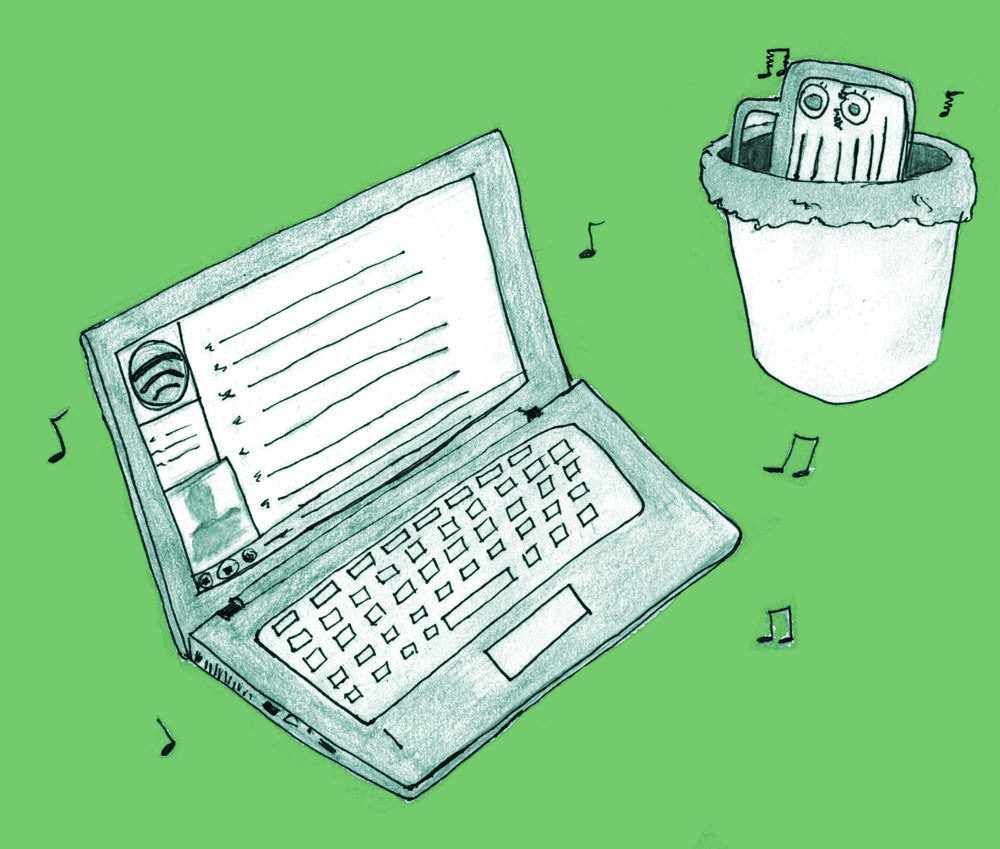
“2013 was our biggest year yet,” reads a thick, green headline on Spotify’s 2013 Year in Review. The Facebook-connected music streaming service recently launched a website dedicated to showcasing its annual usership statistics. Among other numbers, the Swedish company reported that it had over 24 million active users last year.
“I use Spotify,” says sophomore Isa Ng. “I usually listen to music on my phone, but if I’m looking for new music, I go on the Spotify Radio and put in an artist that I like and see what songs come up.” Funded by advertisements and premium memberships, the service offers playlist creation in addition to radio-like song recommendations.
“Internet streaming gives a more personalized experience,” says junior Nicholas Privitera. “You can listen to music you like with a greater variety than normal radio. If you want, you can listen to obscure music because there is no DJ picking the audio for you.”
In the age of the internet, “radio” is no longer an exclusive term for traditional or satellite waves. When Spotify’s predecessor, Pandora, came out 14 years ago, the streaming service started its own version of “internet radio” via the Music Genome Project.
Invented in 1999, the Music Genome Project aims to categorize several genres of music by “genes” or specific characteristics. Pandora uses this data to stream appropriate songs to its users, a process it calls “radio.”
Launched in 2008, Spotify adopted Pandora’s approach to radio and combined it with the ability to listen to artists and playlists. Other services, such as 8tracks and Last.fm, soon followed.
Despite competition, Pandora remains alive and well with many active users. “You can block ads on Pandora,” says sophomore Daniel Ho. “When I’m doing work or playing video games and I want to listen to music, I usually use Pandora because ads distract from the songs.”
Perhaps the most novel and endearing element of Spotify is its Facebook connectivity, a conglomerate decision that has since rapidly accelerated its user base. Like statuses and photos, Spotify records appear on Facebook news feeds.
Some Aragon students applaud the social connectivity inherent in the service. “I think this is a good thing—it’s good for sharing and letting other people know what kind of music you’re interested in,” says Privitera.
Junior Dillon Kim disagrees. “I use it with the Facebook setting turned off. To me, music is more of a personal thing,” he says. “It asked me when I started using it, ‘Do you want to share your music with Facebook?’ and I said ‘No,’ but it kept asking me. Spotify wants access to your information, and I think people should know about that.”
Privacy concerns are not the only concerns afflicting this industry. People are also concerned that radio and the music industry are becoming too personal and less communal as a result of automated radio. Some websites, such as Plug.dj and Turntable.fm, have established chat rooms for sharing and playing music to an online crowd.
Junior Quinn Manely says, “People choose these chat rooms because you get to hear new, different music you’ve never heard before. Maybe you’ll like them, and maybe you won’t, but it’s fun to share tracks.”
Another distinctive problem of the American internet radio industry stemmed from the 1998 Digital Millnnium Copyright Act, which placed royalties on information broadcasted through the internet. Critics of the bill argue that small internet broadcasting firms were unfairly hurt by the royalties while larger companies, could afford the fees throughout the past decade. Although royalties have been decreasing over the years, analysts claim that the act shaped the early internet radio industry in favor of large business.
Despite the demand for internet radio, traditional radio still has a strong standing in consumer audio. According to a Nielsen study, the average American listens to 14 hours of AM/FM radio per week.
“I think traditional radio is slowly moving out,” concludes Ho. “[Currently], not everyone has access to Pandora or Spotify in the car or when they’re not at home. As internet access and these programs become more widespread, I think we’ll definitely see internet radio start to take over.”



